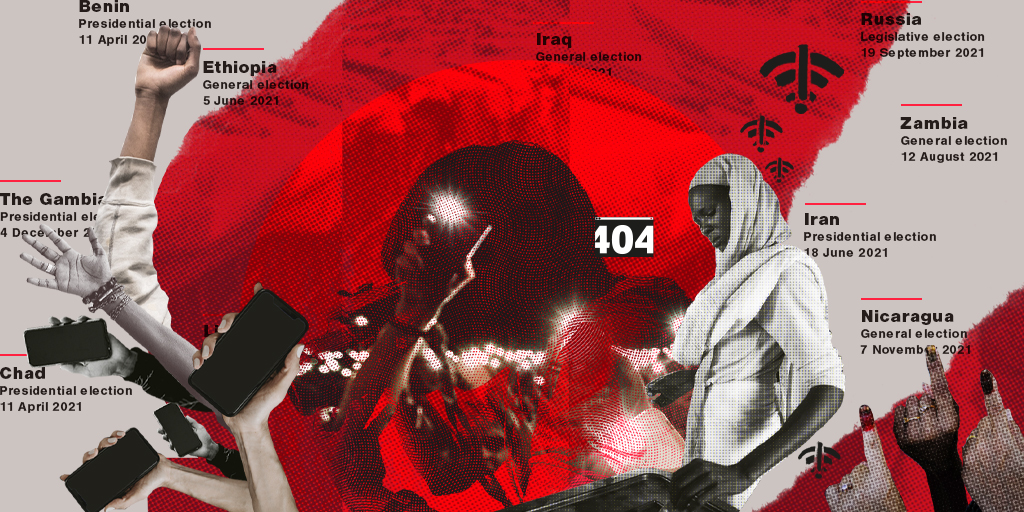Update: September 29, 2021 — Civil society’s fight to restore Twitter access continued in Nigeria today, as the Community Court of Justice of the Economic Community of West African States (ECOWAS Court) held a hearing in the consolidated case of SERAP & Others v. Nigeria. While the Nigerian government attempted to delay the proceedings, the attorneys for the applicants successfully argued to go forward. As the government is still blocking Twitter, any delay in proceedings would have extended the online censorship.
“We’re proud to see the ECOWAS Court push through with the hearing on Nigeria’s Twitter ban,” said Felicia Anthonio, Campaigner and #KeepItOn Lead at Access Now. “These proceedings are justifying civil society’s outrage at online censorship, and hopefully act as a deterrent to other governments looking to pull the same oppressive move.”
During the hearing, the counsels of applicants, including The Socio-Economic Rights & Accountability Project (SERAP), Paradigm Initiative, and Media Rights Agenda, reiterated the shutdown precedent of Amnesty International Togo & Others v. Togo decision, which states that the right to internet access should not be interfered with without proper justification, and emphasized the fact that Nigerian citizens rely on Twitter for their livelihoods and survival.
Counsel Deji Ajare, representing amici Access Now, Electronic Frontier Foundation, and the Open Net Association, as well as amici Amnesty International, argued that, according to the international law, the internet is an enabler of human rights and limiting services like Twitter are not justified even on the ground of national security because the concept of national security is too broad and prone to abuse.
The counsel for another amici, Robert F. Kennedy Human Rights, Ikechukwu Uzoma, argued that internet shutdowns is a global phenomenon, citing the #KeepItOn coalition data showing at least 768 incidents of shutdowns have been documented in 63 countries in the last five years. He additionally stated that there is a growing international consensus that given the COVID-19 pandemic, the internet is key for meeting security and public health goals. The counsel asked to accept these arguments not only in interest of rights of Nigerians but also in the interest of human rights globally.
The Republic of Nigeria asked the Court to dismiss the case claiming it rightfully ordered the platform’s blocking as Twitter refuses to register in Nigeria or to be bound by Nigerian law, highlighting that it never blocked internet access, only Twitter.
The ECOWAS Court will announce its judgement on January 20, 2022.
Update: July 14, 2021 — Last week, the Community Court of Justice of the Economic Community of West African States (ECOWAS Court) announced it will merge the four ongoing #TwitterBan court cases into a single filing. This includes the case in which Access Now has submitted a legal intervention, which the Court admitted at the July 13 hearing, despite Nigeria’s objections.
“We commend the court for allowing civil society’s ongoing legal action against the government of Nigeria’s Twitter ban,” said Hinako Sugiyama, Legal Fellow at Access Now. “The decision to accept our intervention and merge all four cases in the ECOWAS Court allows us to throw our collective weight behind this extremely serious, and precedent-setting lawsuit. Freedom of speech must be upheld.”
On July 8, Access Now formally joined the legal fight to ensure freedom of expression is restored in Nigeria. Together with the Electronic Frontier Foundation and the Open Net Association, the group filed a legal intervention to the Community Court of Justice of the Economic Community of West African States (ECOWAS Court) in support of the Socio-Economic Rights and Accountability Project and over 170 civil society actors and individuals who are challenging the constitutionality of Nigeria’s Twitter ban.
“Twitter is hugely popular in Nigeria, and for good reason. People use Twitter to exchange views, organize, and access essential information about COVID-19,” said Natalia Krapiva, Tech Legal Counsel at Access Now. “The Court must not let the Nigerian government get away with banning Twitter under the guise of ‘political insurgency’ rationale. The decision to shut down a platform undermines international law.”
In accordance with the Nigerian Constitution, the African Charter on Human and Peoples’ Rights, the International Covenant on Civil and Political Rights, and the International Covenant on Economic Social and Cultural Rights, the Nigerian government must show the shutdown was both necessary and proportionate to achieve a legitimate state interest. The government must also prove that the Twitter ban was the least intrusive instrument to obtain the legitimate state interest.
“In the past two years, courts across the world — from Indonesia to ECOWAS itself — have joined the chorus of voices decrying these internet shutdowns as blunt and blatant abuses of power,” said Peter Micek, General Counsel at Access Now. “We trust the ECOWAS Court to uphold the right to free expression and boost the rule of law in Nigeria, and we will expect Nigeria to fully implement the court’s binding decision.”
Access Now thanks Legal Fellow Hinako Sugiyama for developing the model legal brief on internet shutdowns and timely work enabling its adaptation and filing in Nigeria.
The hearing is expected on July 9, 2021.
“Internet shutdowns are always a violation of human rights,” said David Greene, Civil Liberties Director at the Electronic Frontier Foundation. “And this blocking of Twitter is doubly a threat to freedom of expression, with the government using it as a tool to coerce Twitter to publish the government’s favored speech.”
“Platform bans violate UNHRC’s resolution that online speech should be protected like offline speech,” said K.S. Park, Director at the Open Net Association. “When your book is banned, you can distribute leaflets on the street. When a platform is banned, your entire community disappears: there is no marginal breathing room.”
